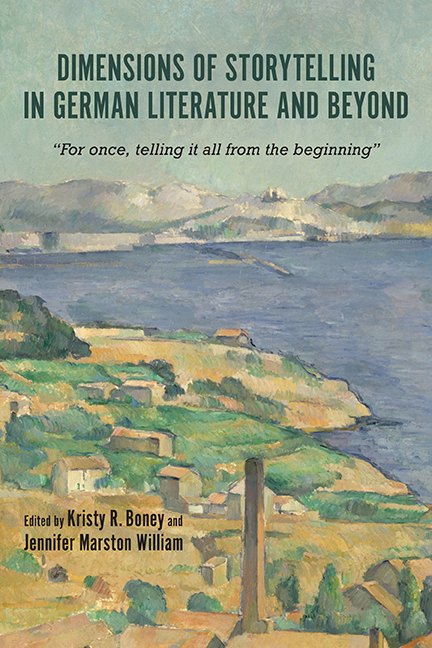 Dimensions of Storytelling in German Literature and Beyond
Dimensions of Storytelling in German Literature and Beyond Book contents
- Frontmatter
- Contents
- Acknowledgments
- Introduction: The Social, Political, and Personal Dimensions of Storytelling
- Part I Anna Seghers: A Missing Piece in the Canon of Modernist Storytellers
- Part II Expressions of Modernity: Using Storytelling Unconventionally
- Part III The Personal Narrative: Storytelling in Acute Historical Moments
- 14 Problems and Effects of Autobiographical Storytelling: Als Pimpf in Polen: Erweiterte Kinderlandverschickung 1940–1945 (1993) and A Hitler Youth in Poland: The Nazis’ Program for Evacuating Children during World War II (1998)
- 15 Too Near, Too Far: My GDR Story
- 16 Conflict without Resolution: Konrad Wolf and the Dilemma of Hatred
- 17 “Bleibt noch ein Lied zu singen”: Autobiographical and Cultural Memory in Christa Wolf's Novel Kindheitsmuster
- 18 Narrating germany's past: a story of exile and the return home—a translation of the chapter “above the lake” from ursula Krechel's Novel Landgericht
- 19 Storytelling in the GDR: An Interview with Eberhard Aurich and Christa Streiber-Aurich
- Notes on the Contributors
- Index
19 - Storytelling in the GDR: An Interview with Eberhard Aurich and Christa Streiber-Aurich
from Part III - The Personal Narrative: Storytelling in Acute Historical Moments
Published online by Cambridge University Press: 12 April 2019
- Frontmatter
- Contents
- Acknowledgments
- Introduction: The Social, Political, and Personal Dimensions of Storytelling
- Part I Anna Seghers: A Missing Piece in the Canon of Modernist Storytellers
- Part II Expressions of Modernity: Using Storytelling Unconventionally
- Part III The Personal Narrative: Storytelling in Acute Historical Moments
- 14 Problems and Effects of Autobiographical Storytelling: Als Pimpf in Polen: Erweiterte Kinderlandverschickung 1940–1945 (1993) and A Hitler Youth in Poland: The Nazis’ Program for Evacuating Children during World War II (1998)
- 15 Too Near, Too Far: My GDR Story
- 16 Conflict without Resolution: Konrad Wolf and the Dilemma of Hatred
- 17 “Bleibt noch ein Lied zu singen”: Autobiographical and Cultural Memory in Christa Wolf's Novel Kindheitsmuster
- 18 Narrating germany's past: a story of exile and the return home—a translation of the chapter “above the lake” from ursula Krechel's Novel Landgericht
- 19 Storytelling in the GDR: An Interview with Eberhard Aurich and Christa Streiber-Aurich
- Notes on the Contributors
- Index
Summary
STORYTELLING IS A MEANS of preserving the way of life from a given time and place: everyday-life details, cultural practices, social values, and political agendas. Furthermore, stories gesture beyond their immediate context and communicate particular views and ideas to the readers. Storytelling and literature in the GDR served both purposes. In the postwar years the promotion of literature focused on a distinct political and social program that was fueled by the need for communicating conceptualizations and practices of the new society to readers. Literature served as an instrument for educating the reader socially and politically. Through literature, values and practices of the new socialist country were addressed, and they were intended to move readers to participate in the process of building socialism in the GDR. In the 1970s and 1980s, after the GDR had been successful in establishing itself and consolidating as a state, literature as well as film, which had become an important cultural product by then, had changed their perspective. The stories now concentrated on introspection into the current state of the socialist society. The forward-looking view of the 1950s and 1960s, the verve and enthusiasm that the stories breathed—depicting the rebuilding of factories, acts of creating and growing, model-type workers and symbolic construction sites—had turned into a mode of reflection and discussion in the 1970s and 1980s.
Preservation through storytelling started out in the GDR in the 1950s and 1960s, with the goal of establishing a particular East German national identity. Literature and film did so through their choice of particular storylines and their discussion of social, political, and work-related issues on the one hand, their choice of scene and their depiction of certain character types on the other. Hence the numerous literary and cinematic images of factories, construction sites, workers, and Communist role models, as well as strong female figures and urban and heavily industrialized landscapes, had synthesized into a distinct East German identity by the mid-1960s. Later, in the 1970s and 1980s, a discussion of the generational gap between the prewar generation and the younger generations in the GDR, a discontent with social and political structures, and changed views on socialist ideals were added to the storylines of cultural products. Books and films formed a major part of the public sphere of the GDR and thus established a quasi-open discussion of the aforementioned topics and discourses.
- Type
- Chapter
- Information
- Dimensions of Storytelling in German Literature and Beyond“For once, telling it all from the beginning”, pp. 252 - 266Publisher: Boydell & BrewerPrint publication year: 2018
